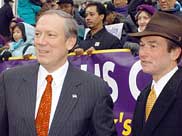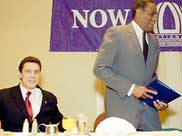|
 |
|
Esta página no está disponible en español. THE NEW YORK TIMESCandidates Try to Fathom New York's Shifting VotersBy Adam Nagourney
February 4, 2002
From left: Gov. George E. Pataki; Dennis Rivera, head of the state health care workers union ---------- (PHOTOS: David Jennings for The New York Times) There have always been a few givens for any candidate contemplating a run for office in New York State: Upstate and the suburbs vote Republican, while New York City goes for the Democrats. Black and Hispanic voters tend to go Democratic, and unions are the engines that bring out Democratic voters. And, recent Republican victories notwithstanding, there are many more registered Democrats in New York than Republicans. But as Gov. George E. Pataki and his two potential Democratic opponents, H. Carl McCall and Andrew M. Cuomo, prepare for the campaign ahead, the rules that have long guided candidates seeking statewide office in New York seem to be out the window. While there is debate in political circles over the extent and permanence of these shifts, there is a growing sense that a realignment has taken place in New York over the last four years that is forcing the gubernatorial candidates and their advisers to reconsider the way they approach this year's contest. Aides to the candidates, in a series of interviews, seized on different elements of the shift to highlight changes that they said benefited their party. Democratic officials, for example, noted the sharp rise in their party's registration in recent years, and strong Democratic showings upstate and on Long Island, traditionally Republican strongholds. Aides to Mr. Pataki noted the governor's success at picking up support of labor unions, Hispanic leaders and other Democratic figures, and the fact that New York City has now elected a Republican as mayor three times in a row. But while it is still early in the contest, it is the Democrats who seem particularly concerned these days as the full picture of this scramble of political allegiances come into focus. And that is a notable change from just six months ago, when many Democrats – cheered by back-to-back victories in New York Senate contests – voiced confidence about the party's prospects of defeating Mr. Pataki. "There is the potential for a total realignment in New York right now," said a prominent Democratic consultant who spoke only on the condition that he not be identified, offering what for Democrats is a gloomy assessment of the state of political play in New York. "Some traditional Democratic constituencies are moving toward the Republicans." ---------- From left: Andrew M. Cuomo, former federal housing secretary; and Comptroller H. Carl McCall. ---------- A Democratic consultant, Richard Schrader, said that while some changes were helping his party, most of them seemed to benefit the Republicans in general, and Mr. Pataki in particular. "Look at how he's expanded his base," said Mr. Schrader, who managed Mark Green's campaign for mayor last year. "Think about the issues. Think about the environment. Think about Vieques. Think about labor issues. He's snatched these issues away from the Democrats. And effortlessly." The concern in Democratic circles has intensified in recent weeks because of the course of the special election campaign on the Upper East Side to replace State Senator Roy M. Goodman, a Republican who retired to take a job in the administration of Mayor Michael R. Bloomberg. The competition between the Republican, John Ravitz, and his Democratic opponent, Liz Krueger, has provided abundant daily evidence of the tenuous cohesiveness of the traditional Democratic coalition. A succession of organizations that normally support Democrats, from labor unions to gay rights groups, have endorsed Mr. Ravitz, responding to promises and pressure from Republicans who control the Senate. Several Democrats suggest that what is taking place now, in advance of the Feb. 12 vote, offers a preview of the gubernatorial campaign. And it comes after a mayoral election in New York City that showed once again that the days when a Democrat would never consider leaving his party's line on the ballot were over. Mr. Bloomberg's election marked the third consecutive time in which an overwhelmingly Democratic city had elected a Republican as its mayor. Still, some forces are working on behalf of Mr. McCall and Mr. Cuomo. To start, the party enjoys a two- million-vote edge among registered voters in New York, a margin that has grown in recent years. "There is a natural Democratic advantage, and you have close to a million new registered Democrats in the last two years," said Mr. McCall's campaign coordinator, Richard Fife. Mr. Cuomo's pollster, Mark Penn, noted the number of Democrats elected statewide and said: "If anything, the Democrats are coming home to Democrats. Pataki is surrounded: There are two Democratic senators, a Democratic comptroller." And, in a hopeful sign for Democrats, the part of New York that is normally solidly Republican – upstate – now appears to be very much back in play. An early sign of this came when Charles E. Schumer, a Democrat, swept United States Senator Alfonse M. D'Amato, a longtime Pataki ally, from office in 1998 after campaigning intensely upstate. Hillary Rodham Clinton did the same thing when she was elected to the Senate in 2000, winning nearly 50 percent of upstate votes against Mr. Pataki's candidate, Rick A. Lazio. During their campaigns, Mr. Schumer and Mrs. Clinton often expressed concern about the state of the upstate economy under Mr. Pataki – the same argument that Mr. McCall and Mr. Cuomo have begun using against Mr. Pataki. Mr. Lazio suffered badly in that campaign when he asserted at a debate in Buffalo that the state economy was in good shape, a statement he made at least in part out of concern that criticizing the upstate economy might provide ammunition to Mr. Pataki's Democratic foes. Aides to Mr. Pataki say Mr. Cuomo will be powerless to use that argument against Mr. Pataki, because so many voters blame his father, Mario M. Cuomo, whom Mr. Pataki unseated in 1994, for the state of the economy. "The most important thing here is Pataki is seen as having led New York from an economic crisis when he came into office," said a senior Pataki adviser, Kieran P. Mahoney. "And that is the proximate cause of why against two very, very well-known Democratic challengers, he has a 2-to-1 lead in every state poll." Whether voters hold Andrew Cuomo accountable for any perceived lapses by his father could prove to be one of the more intriguing questions of this campaign. And it is unclear what Mr. Pataki, who has spent much time criticizing the elder Mr. Cuomo, will do if Mr. McCall wins the race. Several Democrats note that Mr. Pataki has turned much of his attention downstate, particularly after the attack of Sept. 11, in a way that suggests he may be concerned about how he is doing upstate. "He's got to go all over downstate because he's afraid of what upstate is going to do to him – given the economy and education," said Assemblyman Herman D. Farrell, the state Democratic Party chairman. Whatever Mr. Pataki's situation upstate, he clearly appears to be doing well downstate, and in other traditional Democratic quarters. He became a fixture on New York City television stations in the months after the World Trade Center attack, and his identification with recovery and rebuilding efforts could raise his stock among New York City and suburban voters, Republicans and Democrats said. Mr. Pataki has demonstrated unambiguous success in picking up support among the Democratic coalition. The decision by the president of the International Brotherhood of Teamsters, James P. Hoffa, to join the head of the state health care workers, Dennis Rivera, in attacking both Mr. McCall and Mr. Cuomo sent a chill through Democratic circles. The two union leaders assailed the Democrats after Mr. McCall and Mr. Cuomo had criticized the way in which Mr. Pataki pushed through a multi-billion-dollar health care plan that provided raises for members of Mr. Rivera's union. Mr. Rivera now seems inclined to endorse Mr. Pataki outright, or remain neutral. Mr. Rivera's union is renowned for its ability to get out the vote of its members, so his decision to stand aside, or support Mr. Pataki, could be a big problem for either Mr. McCall or Mr. Cuomo. Aides to both Democrats suggested that the effects of such a defection would be limited. "It's one thing about union resources," Mr. Penn said. "It's a whole other thing when it comes to voters behind the resources. I wouldn't include the rank- and-file behind" Mr. Rivera. A senior McCall adviser, Hank Sheinkopf, said flatly of Mr. Rivera's union, "His members will vote for Carl McCall." Yet Mr. Pataki's success at forming an alliance with Mr. Rivera, who is one of the state's most prominent labor leaders and one of its leading Hispanic leaders, also reflects his continuing attempt to gain support among another group of usually Democratic voters, Hispanic New Yorkers. The governor has prominently identified himself with demonstrators against the Navy's practice bombing runs on the Puerto Rican island Vieques, and his aides say that because of President George W. Bush's success at courting Hispanic voters across the country. Republicans have a much stronger shot with Hispanic voters in New York. "In 1998, to try and get Hispanic votes as a Republican in New York was virtually impossible, because the national Republican Party was seen as hostile to Hispanic issues," Mr. Mahoney said. That has changed entirely, he argued. Mr. McCall's advisers say that Hispanic and black voters will be more likely to support him because if he is elected, he will be New York's first black governor. But even Democrats are worrying these days about the possibility that Mr. Cuomo may win a primary that reignites the racial tensions of last year's divisive mayoral primary. In that case, Mr. Pataki may indeed do well in his effort to woo Hispanic voters, while a second normally Democratic constituency, black voters, may be inclined to stay at home.
|

 ----------
----------